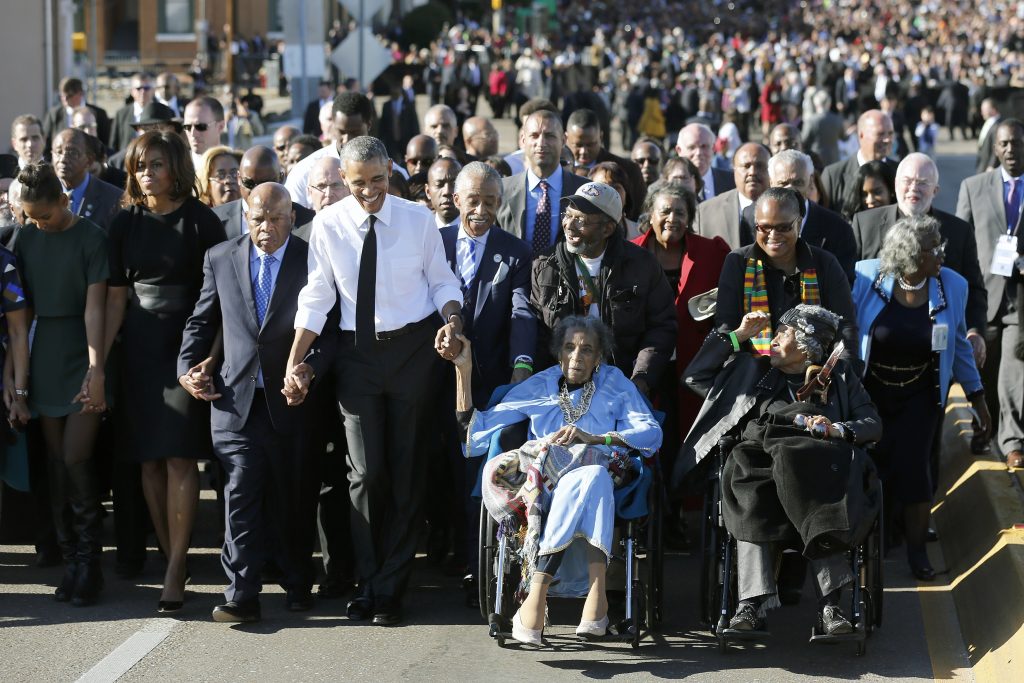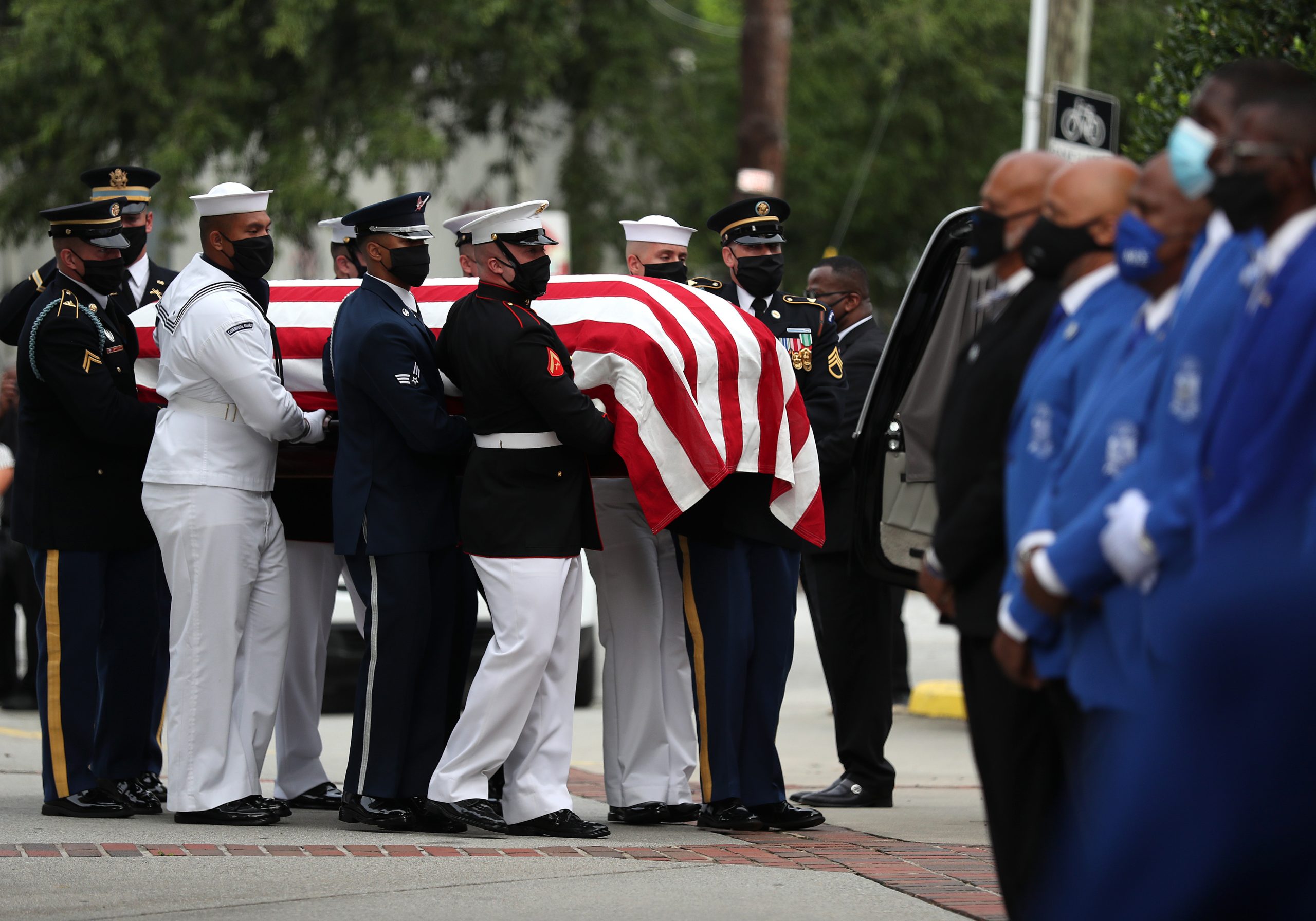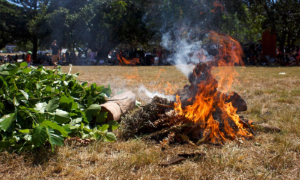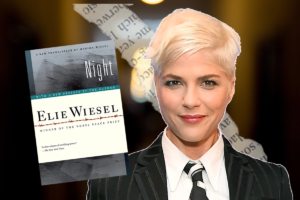Former Presidents Barack Obama, George W. Bush and Bill Clinton gave speeches on Thursday at the funeral for Rep. John Lewis,the Democratic congressman from Georgia and civil rights icon who died earlier this month.
Obama delivered the eulogy, and used it in part to level criticism at what he sees as the Trump administration’s attacks on peaceful protesters and voting rights amid the coronavirus pandemic.
“We can witness our federal government sending agents to use tear gas and batons against peaceful demonstrators,” Obama said. “We may no longer have to guess the number of jelly beans in a jar to cast a ballot. But even as we sit here, there are those in power who are doing their darndest to discourage people from voting, by closing polling locations and targeting minorities and students with restrictive ID laws and attacking our voting rights with surgical precision, even undermining the postal service in an election that’s going to be dependent on mail-in ballots so people don’t get sick.”
Obama did not mention Trump by name.
Earlier in the day, Trump launched his latest attack on states’ vote-by-mail programs, baselessly claiming that they are rife with fraud. Trump even suggested delaying the entire election, which he doesn’t have the power to do and even Republicans pushed back against.
“I know this is a celebration of John’s life. There are some who might say we shouldn’t dwell on such things,” Obama said. “But that’s why I’m talking about it.” He said Lewis “devoted his time on this earth fighting the very attacks on democracy … that we’re seeing circulate right now.”
The private service was held inside the historic Ebenezer Baptist Church, where the Rev. Martin Luther King Jr. was once a pastor.
Obama said Lewis was “perhaps” King’s “finest disciple, an American whose faith was tested again and again to produce a man of pure joy and unbreakable perseverance.”
The first Black president recalled an early example of that perseverance while Lewis was fighting for desegregation in Nashville, Tenn., the early 1960s.
“He and other young men and women sat at a segregated lunch counter, well-dressed, straight back, refusing to let a milkshake poured on their heads or a cigarette extinguished on their backs or a foot aimed at their ribs — refused to let that dent their dignity and their sense of purpose,” Obama said.
Lewis, the son of Alabama sharecroppers, played an instrumental role in the passage of the landmark Voting Rights Act in 1965.
That year, Lewis was beaten by police on the Edmund Pettus Bridge in Selma, Ala., where state troopers beat and used tear gas against peaceful marchers who were advocating against racial discrimination.

In his speech, Obama recalled the event, known as “Bloody Sunday.”
“The thing is, I imagine initially, that day, the troopers thought they’d won the battle,” Obama said. “Except this time there were some cameras there. This time the world saw what happened, bore witness to Black Americans who were asking for nothing more than to be treated like other Americans, who were not asking for special treatment, just equal treatment, promised to them a century before.”
When Lewis was released from the hospital, Obama said, he “would make sure the world saw a movement that was, in the words of scripture, hard-pressed on every side but not crushed, perplexed but not in despair, persecuted but not abandoned, struck down but not destroyed.”
The movement made its way to the White House, and the Voting Rights Act was signed into law.
“I like so many Americans owe a great debt to John Lewis and his forceful vision of freedom,” Obama said. “America was built by John Lewises. He as much as anyone in our history brought this country a little bit closer to our highest ideas. And someday, when we do finish that long journey towards freedom, when we do form a more perfect union, whether it’s years from now or decades or even if it takes another two centuries, John Lewis will be a founding father of that fuller, fairer, better America.”
Lewis, 80, died from complications due to pancreatic cancer on July 18.
Obama recalled the last time he spoke with Lewis following a virtual town hall with young activists fighting for racial equality in the wake of George Floyd’s death.
“Afterwards I spoke to John privately, and he could not have been prouder to see this new generation of activists,” Obama said. “And I told him, all those young people, John, of every race and every religion, from every background and gender, of every sexual orientation, John, those are your children. They learned from your example.”

The two other former presidents at the event also paid tribute to Lewis’s legacy.
Bush said Lewis, who served more than three decades in Congress representing Georgia’s 5th Congressional District, was able to bridge the country’s bipartisan divide.
“John and I had our disagreements, of course,” Bush said. “But in the America John Lewis fought for and the America I believe in, differences of opinion are inevitable elements and evidence of democracy in action. We the people, including congressmen and presidents, can have differing views on how to perfect our union while sharing the conviction that our nation however flawed is at heart a good and noble one. We live in a better and nobler country today because of John Lewis.”
Clinton cited the perseverance Lewis showed in his fight for civil rights.

“John Lewis was a walking rebuke to people who said, ‘We ain’t there yet,’ and ‘We’ve been working a long time, isn’t it time to bag it?'” Clinton said. “He kept moving.”
“John always kept walking to reach the beloved community,” Clinton continued. “He got into a lot of good trouble along the way, but let’s not forget, he also developed along the way an uncanny ability to heal troubled waters. When he could have been angry and cancel his adversaries, he tried to get converts instead. He thought the open hand was better than the clenched fist.”
Clinton also made reference to the posthumous op-ed by Lewis published Thursday in the New York Times.
“It is so fitting on the day of his service he leaves us our marching orders,” Clinton said. “Keep moving.”




